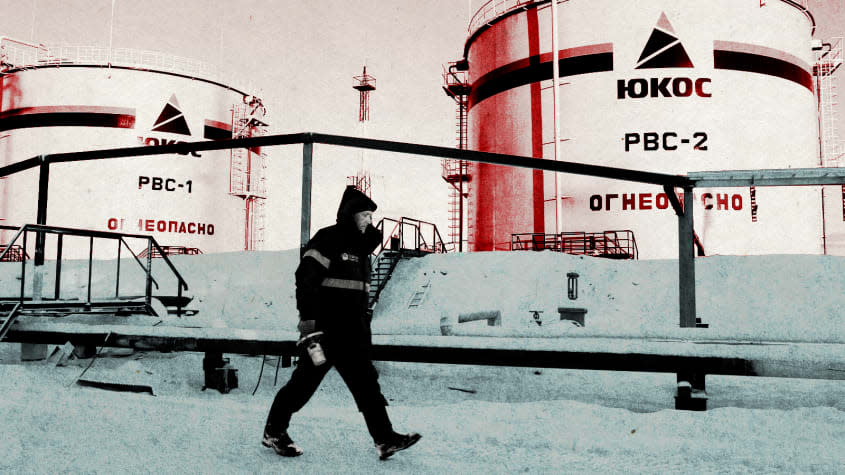How would an EU ban on Russian oil affect the price of gas in America?

- Oops!Something went wrong.Please try again later.
Oil is one of Russia's top exports and the European Union is one of its biggest customers. The EU receives about a quarter of its crude oil imports from the Russia. The EU is trying to finalize another round of sanctions against Russia, including a ban on imports of crude and refined fuels, but Hungary, whose Prime Minister Viktor Orbán is an ally of Russian President Vladimir Putin, is opposed, saying such a move would be an "atomic bomb" on his economy. Here's everything you need to know:
Where does the world's oil come from?
The United States, Saudi Arabia, and Russia are the world's three biggest oil producers. While most of the U.S. supply is consumed domestically, China is the largest single buyer of Russian oil; in 2021, the country sold 1.6 million barrels of crude oil a day to China.
Why ban oil and why now?
The European Union's executive arm, the European Commission, is trying to piece together its sixth sanctions package against Russia, in response to the invasion of Ukraine. On May 4, European Commission President Ursula von der Leyen announced one of the proposals: a ban on Russian oil imports by the end of the year, with Hungary and Slovakia given an extension to the end of 2023. "Let us be clear, it will not be easy," von der Leyen told the European Parliament. "Some member states are strongly dependent on Russian oil, but we simply have to do it."
In order for this sanctions package to go through, it must be supported by all 27 members of the EU, and there has been some pushback. Slovakia gets almost all of its oil from Russia, and a government spokesperson told Politico the country wouldn't be ready for a total ban until 2025 at the earliest. In the last few years, Hungary has increased its oil imports from Russia, and Orbán said last week that the proposal now under discussion "creates a Hungarian problem, and there is no plan to solve it."
Would this EU ban have an impact on how Russia is funding the war in Ukraine?
In a March report, the European Federation for Transport and Environment said Russia was making $285 million per day just through European oil transactions. This is a major source of funding for the war, and stopping these payments would have an immediate impact. Von der Leyen warns that moving too quickly could cause more problems, and she is calling for action in an "orderly fashion" to ensure global markets aren't disrupted as well.
It's not likely that Russia will be able to sell all of its European oil allotment to other countries, but with phased sanctions, Russia will have more time to "find alternative buyers of their crude — there are plenty of willing buyers in India, China, and other parts of Southeast Asia," Ajay Parmar, senior oil analyst at the energy intelligence service ICIS, told Politico.
How would the EU ban affect the United States?
Energy markets are global, and after the EU proposal was announced, crude prices —which have already spiked because of the Russian invasion of Ukraine — jumped more than 4 percent. In the United States, the cost of a gallon of gas is directly affected by the global price of crude, NPR reports, and that's why the average price rose to more than $4 a gallon and is staying there, according to data from American Automobile Association. Since the Biden administration started releasing roughly 1 million barrels a day from the country's Strategic Petroleum Reserve, there has been some relief at the pump, but this emergency action is scheduled to end after six months.
As part of its sanctions against Russia, the U.S. has banned imports of that country's oil and gas, but prior to that, Russian oil only accounted for roughly 3 percent of total U.S. consumption in 2021, The Washington Post reports.
Is there a way for other oil producers to make up for deficits?
The 13-member Organization of the Petroleum Exporting Countries (OPEC) and its allies, known collectively as OPEC+, could theoretically start increasing production as a way to resolve shortages, but Parmar told Politico he doesn't see this happening anytime soon. There are a few reasons for this, NPR says, including the fact that Russia is a member of OPEC+, and if the Moscow feels threatened or leaves the alliance, it could cause the global price of oil to go up even higher. Additionally, several of the OPEC+ countries are already having a hard time meeting their quotas due to local unrest and conflicts, poor management, and underinvestment.
You may also like
Biden announces free internet for millions of low-income Americans
Bragging about blowing up Russian generals could get us all killed
Pentagon sees 'anecdotal reports' Russian officers are slow-walking attack orders in Ukraine

